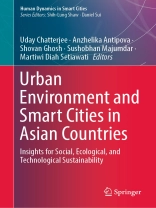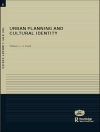This book offers a thorough description of the challenges posed by increasing global urbanization. In addition, comprehensive perspectives are offered on how the contemporary urban challenges of our time are tackled by existing designers, architects, urban planners, and landscape architects thereby considering climate change, migration, resilience, politics, and environmental degradation. It includes insights from environmental design, geography, strategic planning, and engineering design. It goes beyond the jargon of technical innovation, and exposes the political, social and physical effects of digitalizing the world in smart cities. The book focuses on the application of geospatial technology of smart cities – including system design for basic services, real-time control and the Internet of Things. It highlights the planning of land use, strategic development, and ecosystem-based knowledge to enhance economic growth and healthy urban environment and smart city management. The book also shows the contradictory aspects of smart city studies, and provides useful insights into the creation and execution of policies to strengthen decision-making processes in smart cities. This book leads the reader to a greater understanding of smart city growth, both theoretical and realistic and as such it provides an interesting read for urban geographers, urban designers and planners, environmental specialists, practitioners, students.
Table of Content
Section- I- Introduction: 1: Urbanism and Sustainable Development: A Dynamic Approach: Vasco Barbosa, Aldo Alvarez Risco.- Section-II –Urban and Smart Cities Land use Dynamics and Changing Biodiversity: 2: Problems of Habitat Destruction and Shrinkage of Wetlands, Change in Forest Cover: Nestor Asiamah, James Hayes.- 3: Resource Allocation, Depletion and Changing Urbanization and Future Smart Cities: Mohamed Elhoseny, Beata Wieteska-Rosiak.- 4: Urban and Smart Cities Changing Bio-diversity related to Water Scarcity and Flood using of geospatial technology- Case Study: Rostam Saberifar.- 5: Remote sensing and GIS-based study on Soil Erosion, Land Contamination, Land Degradation and Smart Cities: Narsimha Adimalla.- Section-III –Climate Change and Urban and Smart Cities Health and Waste Management: 6: Web-based Analysis of Air, and Water Pollution in Urabn and Smart Cities- Case Study: G.K. Panda, Sailesh Samanta.- 7: Smart Cities and Associates Solid Waste, Bio medical Waste, E-Waste issues and Management: Md. Atiqur Rahman, Jogesh Laishram.- 8: Smart Cities and Associated Problems of Temperature increase and heat island, Issues Related with Global Warming using spatial information: Abul Basar, Nils Ruther, Ashwani Tiwari.- Section-IV –Advances on Urbanism and Smart Cities Socio-Environmental Perspectives.- 9: Urban Population Growth, Urban Sprawl, Smart City and Associated Problems: Meysam Argany, Clement Chipenda.- 10: Artificial Intelligence and Urban Hazards, Smart City Environment and Societal impact: V.Kasthuri Thilagam, Uday Chatterjee, B. Chakraborty.- 11: Using Geospatial Application and Urban/Smart City Energy Conservation- Case study: Scott Berson, Jorge Cerda.- Section -V –Urban Environmental Management, Solutions, and Sustainable Smart Cities: 12: Urban Ecosystem Services, Environmental Planning, and Smart Cities Management: Jay Mittal, Madhuri Sharma.- 13: Smart Cities Urban Governance, Green Space and Policy Planning to Achieve Sustainability: Anthony Mushinge, V.Kasthuri Thilagam.- 14: Smart City Planning and Management and Internet of Things (Io T): Somnath Ghosal, V.R. Sumathi.- 15: Sustainable Smart City Planning, Innovation, and Management: Adekunle Olusola Adeyemo, R.M.K.Ratnayake.- 16: Future Strategy for Sustainable Smart Cities: Dinesh Kumar Kandaswamy, Ahmed Alhuseen, Amir Shakibamanesh.- Section-VI- Conclusions: 17: Concluding Chapter: Uday Chatterjee, Madhuri Sharma, Sushobhan Majumdar, Jay Mittal.
About the author
Dr. Uday Chatterjee
is Assistant Professor in the Department of Geography, Bhatter College, Dantan, Paschim Medinipur, West Bengal, India and an Applied Geographer with a Post-Graduate in Applied Geography at Utkal University and Doctoral Degrees in Applied Geography at Ravenshaw University, Cuttack, Odisha, India. He has contributed various research papers published in various reputed national and international journals and edited book volumes. He has authored jointly edited book entitled ‘Harmony with nature: Illusions and elusions from Geographer’s perspective in the 21st Century’ (with Prof. Shubhra Chandra). His areas of research interest cover Urban Planning, Social and Human geography, Applied Geomorphology, Hazards & Disasters, Environmental Issues, Land Use and Rural Development.
Dr. Anzhelika Antipova is Associate Professor in the Department of Earth Sciences, University of Memphis, Memphis, Tennessee, United States. Her areas ofresearch interest cover Urban Planning, urban and economic geography, medical/health geography, transportation studies.She has contributed various research papers published in various reputed national and international journals and edited journal special issues and book volumes. She has served as a reviewer for many International journals and books.
Dr.Shovan Ghosh, an Associate Professor in the department of Geography, Diamond Harbour Women’s University, South 24 Pargana, West Bengal, has completed his M.A. and Ph.D in Geography from the University of Burdwan, West Bengal. He has secured first position in both under graduation and post-graduation level. He served as an Assistant Professor for more than ten years at Ramananda Centenary College, Purulia, West Bengal. His area of interests lies in Human Geography, Environmental Issues, Education and Geography, Regional planning, Backward Region Development, Urban Planning.
Dr. Sushobhan Majumdar is worked as an independent researcher after being awarded Doctoral degree from Jadavpur University in 2018. He was received post graduates i.e. M.Sc. degree from Presidency University and Jadavpur University in Geography and Geo-informatics. He was also engaged in a project focusing on population profile of Kolkata city under the Government of West Bengal. He has published on issues of sprawl, transportation, health issues and microclimate of urban areas under national and international repute. He is currently expanding his research on the relationship between land use and surface temperature with its spatial modeling.
Dr. Martiwi Diah Setiawati is a research fellow at the Research Center for Oceanography, National Research and Innovation Agency (BRIN)-previously known as Indonesia Institute of Sciences (LIPI). She obtained her Bachelor’s degree in marine science and technology from IPB University, Indonesia, in 2009. In 2012, she got a Master of Science in Udayana University, Indonesia, and a Master of Engineering in Yamaguchi University, Japan, under a double degree program. She received her Doctoral Degree in Environmental Science and Engineering from Yamaguchi University-Japan in 2015. From 2016 until March 2021, she joined the Integrated Research System for Sustainability Sciences (IR3S), The University of Tokyo as a project researcher under the Climate Change Adaptation Initiative Project in Indonesia. As an environmental scientist, she is interested in remote sensing and GIS application to multiple environmental conditions, including habitat studies, disaster mitigation, climate change impact assessment, and adaptation. Her previous research projects cover the integrated climate assessment – risks, uncertainties, and society and developing models to predict future health risks posed by changes in climate, land use, and population.












